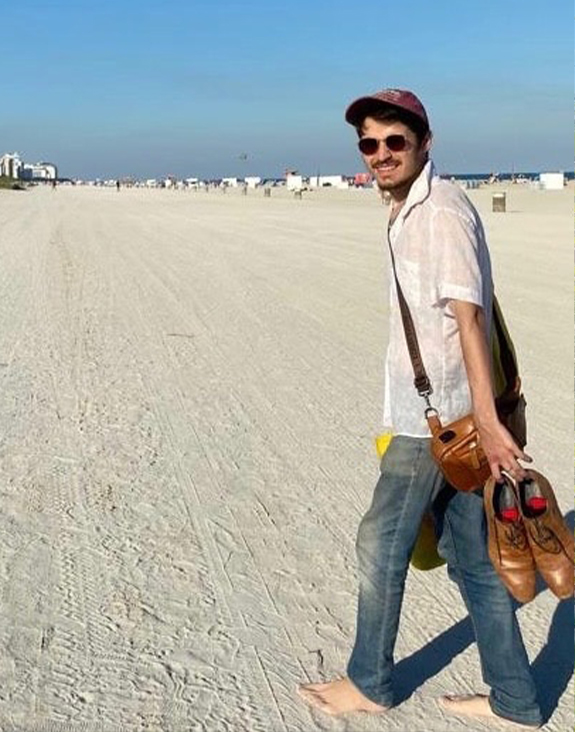Slavic Studies congratulates Marsel Khamitov, who recently defended his dissertation proposal, which is titled “Reimagining Friendship of Peoples: Visions of Multiethnic Polities in Late Soviet Literature.”
We interviewed Mr. Khamitov to find out more about the research topic.
What will your dissertation be about? Please give us the elevator pitch.
My dissertation will be about alternative literary visions of the Soviet multi-ethnic state in the 1960s–1980s, informed both by the official internationalist discourse and by the traumatic experience of mass ethnic deportations in the Stalin era. I believe that literature played a crucial role both in the official project of the “friendship of peoples” and in the peoples’ own social imaginaries. The conventional historiographic narrative of the region most often presents the “natural” transition from the imperial ‘prison of peoples’ (which the Soviet Union was not) to independent nation-states (which many people living there neither experienced nor wanted). Instead, the authors that I plan to work with developed alternative political visions of the Soviet multi-ethnic space: the egalitarian federation of autonomous national republics; the space of shared Russophone culture with equal access to its national and international capital available to all Soviet citizens; and small-scale multilingual communities with their genuine grassroots “friendship of peoples.” I hope to engage with the authors of very different ethnic, linguistic, and cultural backgrounds—from the Crimean Tatar writer and politician Shamil Alyadin who wrote in Crimean Tatar to the Abkhaz writer Fazil Iskander who wrote predominantly in Russian—to give a large, decentralized picture of alternative political imagination in the late Soviet period.
How did you come to this topic?
Coming myself from one of the “national republics” of Russia, I’ve been always interested in the Soviet project of “friendship of peoples”, in its political promise (and failure) to manage the astonishingly diverse—ethnically and linguistically—population. I believe that the increasingly influential trend to unmask the imperial structures behind the relationships between the RSFSR and other republics is hugely important; however, it is a common fallacy to mechanically apply the postcolonial approach to the (post-)Soviet context and thereby ignore the important differences between the Soviet Union and classical colonial empires. One of my aims is, then, to show that the project of “friendship of peoples”—both in its official design and in its actual forms—was much more complex. A huge inspiration for me has been Jane Burbank and Frederick Cooper’s newest book, Post-Imperial Possibilities (2023), in which they argue that the nation-state is not the only possible historical path and that the centuries-old experience of living in empires helped people all over the twentieth-century globe to imagine polities distinguished by diversity and complexity rather than by the forced homogeneity of the nation-state. Late Soviet literature—catastrophically underrepresented in Slavic studies—might be very illuminating in this regard and provide important examples of alternative political imaginaries beyond the empire and the nation-state. That is especially relevant today, as the Russian Federation in its current form is in deep crisis.
What are the next steps for you in researching and writing?
One of the main aims of my dissertation, as I see it now, is to highlight the productive multiethnicity and multilingualism of late Soviet literature and culture, by no means limited to its Russian part. This implies at least reading knowledge of the languages of different Soviet groups—so, right now I am trying to master my knowledge of Turkish, German, Ukrainian, and Polish. Developing a more complex and comprehensive picture also requires the reconstruction of the larger sociopolitical context of the “friendship of peoples” project in its official and unofficial forms. I plan to work closely with the materials of the official institutions, first of all the Druzhba narodov journal and the Maxim Gorky Literature Institute, and with the regional media such as the Crimean Tatar official journal Yıldız and samizdat bulletin Informatsia. These media provide an important framework for the literary visions of the “friendship of peoples.” My next task will be to refine the structure of the dissertation and carefully select the cases, authors, and texts among those many that I find interesting and indispensable in the discussion of this topic. Most challenging for me will be to make the whole picture representative and comprehensive, while also keeping the project manageable in a three-year period. Short as it is, this is still the longest period I’ve ever planned on a single topic—and approaching a long-term project like this is both thrilling and inspiring.
